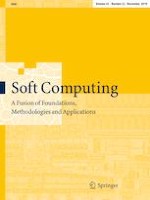18.01.2019 | Methodologies and Application
Link prediction in signed social networks based on fuzzy computational model of trust and distrust
Erschienen in: Soft Computing | Ausgabe 22/2019
EinloggenAktivieren Sie unsere intelligente Suche, um passende Fachinhalte oder Patente zu finden.
Wählen Sie Textabschnitte aus um mit Künstlicher Intelligenz passenden Patente zu finden. powered by
Markieren Sie Textabschnitte, um KI-gestützt weitere passende Inhalte zu finden. powered by
